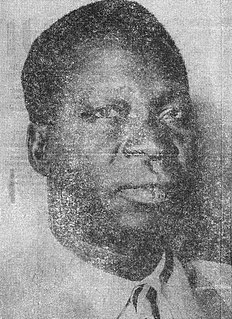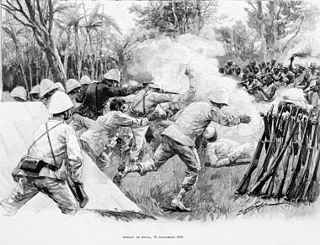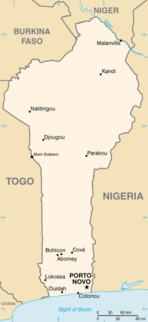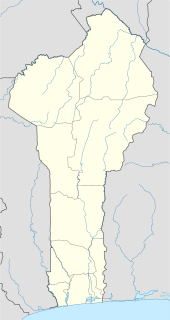
French Guinea was a French colonial possession in West Africa. Its borders, while changed over time, were in 1958 those of the current independent nation of Guinea.

Béhanzin is considered the eleventh King of Dahomey, modern-day Benin. Upon taking the throne, he changed his name from Kondo.

Sourou-Migan Marcellin Joseph Apithy was a Beninese political figure most active when his country was known as Dahomey. He arose on a political scene where one's power was dictated by what region in Dahomey one lived in.

Coutoucou Hubert Maga was a politician from Dahomey. He arose on a political scene where one's power was dictated by what region in Dahomey one lived in. Born a peasant in 1916, Maga served as a schoolmaster from 1936 to 1945, during which time he gradually gained considerable influence among the uneducated. He was elected to Dahomey's territorial assembly in 1947 and founded the Northern Ethnical Group, later renamed the Dahomey Democratic Rally. In 1951, Maga was elected to the French National Assembly, where he served in various positions, including premier from 1959 to 1960. When Dahomey gained its independence from France on August 1, 1960, Maga was appointed to the presidency, and was officially elected to that post on December 11.

The First Franco-Dahomean War, which raged in 1890, was a conflict between France, led by General Alfred-Amédée Dodds, and the Dahomey under King Béhanzin. The French emerged triumphant after winning the Battle of Abomey.

The Second Franco-Dahomean War, which raged from 1892 to 1894, was a major conflict between the French Third Republic, led by General Alfred-Amédée Dodds, and the Kingdom of Dahomey under King Béhanzin. The French emerged triumphant and incorporated Dahomey into their growing colonial territory of French West Africa.
Michel Ahouamenou was a Beninese politician and diplomat, most active when his country was known as Dahomey.

The Dahomey Expedition commemorative medal was a French campaign commemorative medal. It was bestowed to the participants of the First Franco-Dahomean War (1890) and of the Second Franco-Dahomean War (1892–1894) in order to commemorate their feats of arms.

This is a survey of the postage stamps and postal history of Benin, formerly Dahomey.

The Presidential Council was a triumvirate system of government in the Republic of Dahomey from 7 May 1970 until 26 October 1972. The Presidential Council included Hubert Maga, Justin Ahomadégbé-Tomêtin, and Sourou-Migan Apithy as equal members of a council which held all legislative and executive power in the state of Dahomey.

Administrative Council elections were held in Dahomey for the first time in 1925.

Administrative Council elections were held in Dahomey in 1928.

Administrative Council elections were held in Dahomey in 1934.

Administrative Council elections were held in Dahomey in 1936.

Administrative Council elections were held in Dahomey in 1930.
Grâce d'Almeida Adamon (1951–2005) was a Beninese lawyer, feminist, and human rights activist.
Louis Hunkanrin was a Dahomeyan writer, educator, journalist, and politician. He was one of the earliest critics of French colonial power in his country, later renamed Benin.
Francis Aupiais was a French Roman Catholic missionary, anthropologist, and writer.

The 1972 Dahomeyan coup d'état was a military coup staged on 26 October 1972 by Major Mathieu Kérékou, who took control of the Republic of Dahomey and ended a system of government established following the annulled 1970 presidential election, in which three members of the Presidential Council were to rotate in power. Ahomadégbé-Tomêtin served as the Chairman at the time of the coup.














